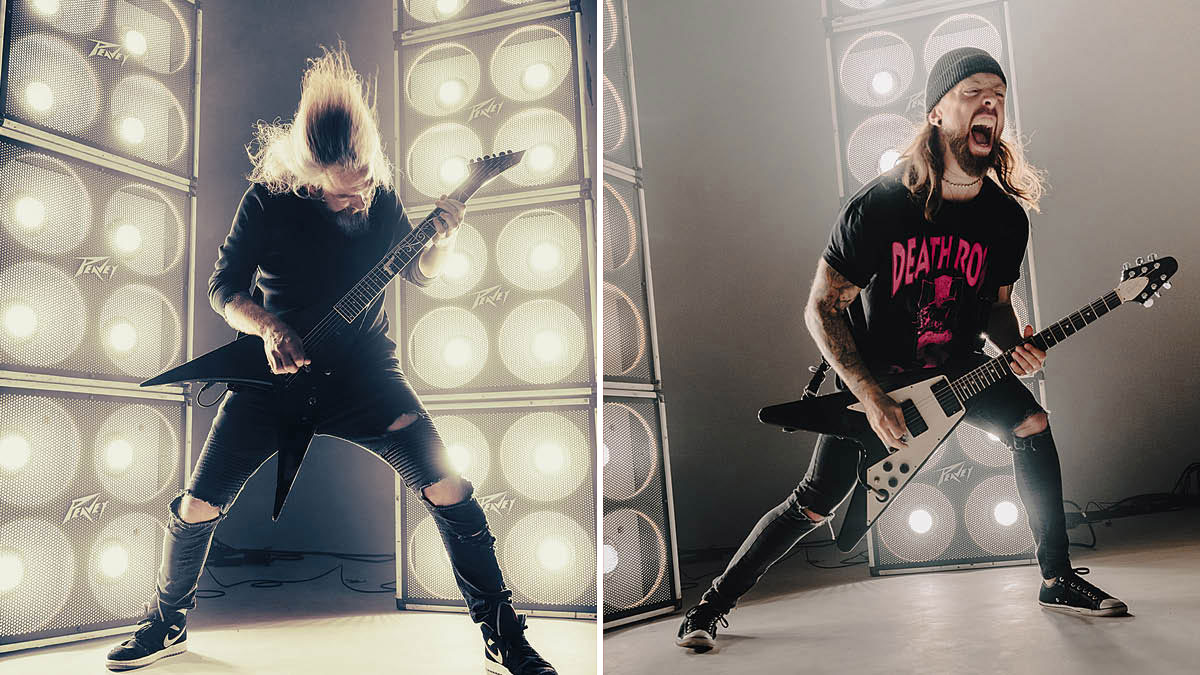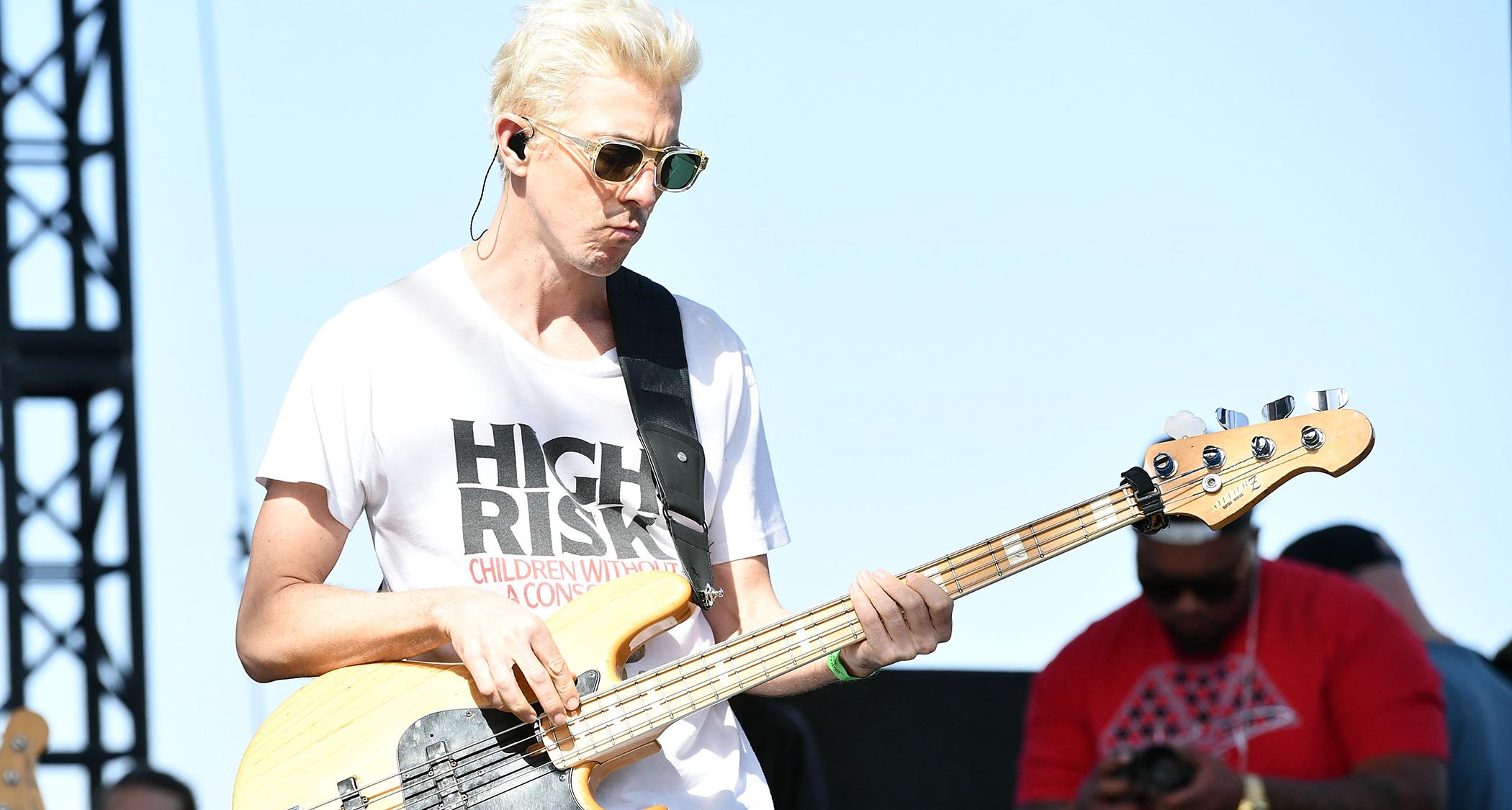Bullet For My Valentine: "We’ve already proven we're a dynamic metal band. This time, it’s more aggressive and technical"
Matt Tuck and Michael ‘Padge’ Paget return with a searing new album that rediscovers the joy of making things heavy

All the latest guitar news, interviews, lessons, reviews, deals and more, direct to your inbox!
You are now subscribed
Your newsletter sign-up was successful
Bullet For My Valentine guitarists Matt Tuck and Michael ‘Padge’ Paget are no strangers to reinvention. Throughout the course of a 23 year-career, the band have continually searched for new ways to equate anthemic melody against metallic heaviness.
In 2018, their sixth album Gravity saw them experiment further away from their thrash metal roots, embracing more radio-friendly structures and flirting with electronica while still remaining very much a guitar band. But now the pendulum has swung again with a new, self-titled album that could be their heaviest yet.
“We wanted this to be an extreme version of our band,” Matt says, as he and Padge describe how the new songs were created – from the first bunch of riffs to the shredding solos they call ‘widdly bits’...
When did the songwriting process begin for the new album?
Matt: “I think we started in the studio back in Spring 2019, a long time ago now! We did some block writing sessions at a place called Vada, which is this really cool residential studio in Alcester. We just started putting ideas down. They weren’t songs as such, just riffs or sections to catalogue as many as we could while we were there.
“Working there, we could double up the workload when preparing for a tour, there was a big live room. So we’d either be in there or in the studio. It was a productive working environment. We wanted to show people what we’ve got. We’re more than capable of it.”
Padge: “[The new album] reminds me of the ferocious metal we grew up listening to – stuff like Pantera, Machine Head, Metallica, Slayer and Slipknot.”
All the latest guitar news, interviews, lessons, reviews, deals and more, direct to your inbox!
In some ways, it feels like that heaviness is connected to Gravity being less abrasive.
Padge: “Gravity was definitely the catalyst that took us in this direction but everything felt great and no-one’s complaining. It felt right though, to me anyway, for us now to do a heavy record and throw something like this out there.”
Matt: “The new album is a direct consequence of Gravity. If we hadn’t had gone there, this probably wouldn’t have come out as aggressive. So that’s a win-win in my opinion – I love Gravity, but it was a divisive record. We knew that while we were writing it and everyone thought that when it came out. But that’s what you’ve got to do as an artist, stay true to yourself and do what you love. You’re not writing for other people; it should be what you believe in.
“This time round was no different, it just happens that the contrast was very obvious and extreme. And I like those extremities. We’ve already proven that we’re a dynamic metal band. This time, it’s more aggressive and technical... Guitar players and metalheads are going to love that! I don’t think we’ve ever been happier, which feels strange. Usually there’s a bit of whinging, but this time round everyone is really happy with the results.”
And for you, Padge, it must have exciting to be shredding harmonic minor solos again, like you do on the opening track, Parasite.
Padge: “Is that what the scale is? We just call them widdly bits [laughs]! We actually filmed some behind the scenes stuff and it was quite mad. The sessions happened really fast. I didn’t remember doing some of the things I did and watching back it was like, ‘Bloody hell, that’s some really good shit!’ I don’t like to suck my own dick a lot, but I was quite impressed watching the footage. We all put our hearts and souls into this one.”
What’s your approach to constructing solos like that?
Padge: “I’ve always had the same approach. I’ll get 16 bars in total, so I’ll split that up in more and more sections, working out each one at a time. I’ll mess around until something sounds good, coming up with an idea of where I start and where it ends. I like to make sections and then piece them all together. If everyone likes it, happy days. If there’s a little lick they want me to swap out, I’ll try something else. I’m totally open to suggestions... I actually like hearing what the others have to say after a take.”
Matt: “It felt right to put these moments back in. They weren’t kept off Gravity deliberately, it’s just that those songs were written in a way that didn’t call for those moments. They would have been so out of place. This time round, I think seven out of 10 songs have solos, which meant Padge got his moments to shine.
“The Parasite solo is pretty much as I heard it on the demo Padge sent back, he did his sections and that was it. Not all solos come out that quickly, but that one felt really natural. There wasn’t any overthinking – it was just attack, shred, kill, finish on the one and move into the chorus. It came out very fluid, which is exactly what a great guitar solo should be.”
Can’t Escape The Waves has an almost tech-metal feel in places.
Matt: “I’m not a huge fan of really technical and progressive metal – I find it too complicated! I guess I’m more of a classic ‘meat and two veg’ man when it comes to songs. But that one definitely has its moments. It just so happened that the chorus went into threes very naturally, which doesn’t happen a lot.
“Trying to blend fours and threes can be a bit of a nightmare, it’s alright getting into it but coming out can cause a headache a lot of the time. I’ve gone back to simple techniques, like three staccato stabs to get back into four. That one ended up being one of my favourites musically and lyrically. It’s a very poetic song.”
Bastards is another standout track, especially in terms of how the guitars work against the drums.
For the last couple of records we’ve used Kempers, which have always worked great. We use them live, too. We’ll probably never go back to live amps ever again
Matt Tuck
Matt: “It’s a mad one. On paper, it doesn’t make any sense. If you wrote down the structure and the journey it takes you on, it’s really bizarre. I don’t think anyone would deliberately try to write a song like that. It’s unique like Tears Don’t Fall was for us, and was very challenging to write.
“It took the longest to complete because it kept going and I didn’t know where to end the sections. But it had that standout anthemic chorus people expect from us. The picky riff in the verses is actually how the song was born. I wrote that in a dressing room in Slovakia or somewhere two years ago and I only just got round to finishing it off.
“I was playing on some little practice amp with a tiny bit of reverb on it and recorded it on my phone. I started mapping it out with our producer Carl [Brown] later and we got there in the end. It also has one of my favourite guitar solos from Padge, like he’s kicking the door down with his hair blowing in the wind!”
Padge: “That’s the only one that was scratched on the spot. Everyone was there when I recorded it at my place last summer. It freaked me right out because that kind of song is completely alien to me. It came out great, though!”
What can you tell us about the guitar amps and guitars we’re hearing on the record?
Matt: “For the last couple of records we’ve used Kempers, which have always worked great. We use them live, too. We’ll probably never go back to live amps ever again, just because of the ease and logistics. But this time the main rhythm tones came from my Diezel VH4 heads.
“We isolated a cab, cranked the shit out of it, put a Tube Screamer in front with super-high-output EMG pickups. It was nothing complicated – just raw, heavy and intense.
“There was also a Phase 90 on some half dirty tones for that wobbly effect and a Slash Octave Fuzz, which we put underneath the rhythms when we needed a heavier tone on songs like My Reverie. It’s really subtle and hard to hear, but when you take it away you realise just how much low-end and fuzz it adds underneath. Oh, and I used a DigiTech Whammy for the first time on Knives and Paralysed.”
Padge: “I think I used the Kemper Soldano profile for my leads. It sounded a bit smoother to my ears. We shot out a couple of guitars, but Matt’s black Les Paul Custom sounded the best. It just beat everything else, every time. There’s a wah-wah on most of my solos, and that came from a Morley Bad Horsie. That was it, really. Just standard stuff, but used effectively!”
- Bullet for My Valentine is out now via Spinefarm.
Amit has been writing for titles like Total Guitar, MusicRadar and Guitar World for over a decade and counts Richie Kotzen, Guthrie Govan and Jeff Beck among his primary influences as a guitar player. He's worked for magazines like Kerrang!, Metal Hammer, Classic Rock, Prog, Record Collector, Planet Rock, Rhythm and Bass Player, as well as newspapers like Metro and The Independent, interviewing everyone from Ozzy Osbourne and Lemmy to Slash and Jimmy Page, and once even traded solos with a member of Slayer on a track released internationally. As a session guitarist, he's played alongside members of Judas Priest and Uriah Heep in London ensemble Metalworks, as well as handled lead guitars for legends like Glen Matlock (Sex Pistols, The Faces) and Stu Hamm (Steve Vai, Joe Satriani, G3).







